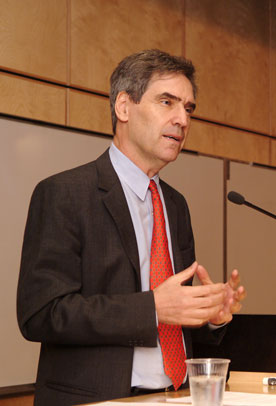Michael Ignatieff on the pitfalls of punditry
Journalists draw their authority from being witnesses to history

Michael Ignatieff delivers the inaugural Reader’s Digest Public Lecture. The talk, held in the Science Complex auditorium, drew an overflow crowd.
Photo by Kate Hutchinson
Given his brilliant career as a journalist, author of 11 books and commentator on international affairs, Michael Ignatieff has earned the right to put on airs, but he’s not interested.
In a compelling lecture to Journalism students and alumni on Sept. 23, Ignatieff was frank and modest. He provided some striking insights into the role of the journalist.
He had been asked to speak on “the role of the journalist as public intellectual,” but he remarked, “I’m not sure what kind of journalist I’ve been, and I’m not terribly happy to be called a public intellectual.
“I prefer to be called a writer; you know where you are with a writer. But with intellectuals, you always want to ask, Who appointed you? Show me your badge! Let’s be frank: It’s pretentious to call yourself an intellectual.”
Ignatieff said journalists’ authority comes not from their ideas but from their sources, and their facts.
“The great thing about journalism, and its saving limitation, is that you only have to know what you know for now. Truth is date-stamped for a journalist, which saves him or her from being called to account if the facts turn out to be otherwise, later on.
“When I worked at the Globe and Mail, I kept being told that all newspapers end up as fish wrapper. It’s very humbling, and good advice.”
Intellectuals, on the other hand, place a capital T on Truth. “They make a much grander claim about the truth, and about themselves: that they see the bigger picture, they see where the facts are headed.
“The journalist works on a story, and the intellectual works on the master narrative, with a larger and more permanent meaning — which is exactly why intellectuals are so ridiculous. They don’t realize that the bigger picture is precisely what human beings don’t usually get to see.
“We’re too close, all of us, including the smartest people who ever lived.”
He said that while intellectuals provide argument and opinion, journalists provide “just the facts, ma’am.” But he reluctantly accepted the intellectual tag for himself, “as pretentious as it is,” and asked what gave him the authority even to stand and speak at a university.
“The authority that some great journalists have had consists of this important fact: they were there. They saw it with their own eyes; they heard it with their own ears. Their authority is rooted in their presence.
“We’re too close, all of us, including the smartest people who ever lived.”
“Edward R. Murrow was in war-time London. Peter Jennings was at the Munich Olympics.
You can’t have authority on any subject unless you walked the streets, talked to the people, felt scared, felt good, felt confused (and you’re usually confused) about the place you’re in.”
“That is the authority I’ve acquired, which distinguishes me from commentators and academic experts who never leave the library: I was there.”
Ignatieff felt the impact of that statement in the former Yugoslavia, while working on the BBC-CBC documentary series Blood and Belonging.
“You could talk all you want about ethnic cleansing, but until you took a drive east toward Belgrade and stopped off at the Croat villages cleared of Croats, or Serb villages cleared of Serbs, you didn’t understand just how diabolical ethnic cleansing actually was.”
Ignatieff felt the need to step back and examine the broader phenomenon of ethnic wars.
He wrote four books on the subject, blurring the lines between the journalist and the intellectual. He became known as an interventionist, and as a somewhat controversial pundit.
“It was this issue that turned me from a reporter into a public advocate of intervention in defence of human rights. Causes create public intellectuals, as much as public intellectuals create causes.”
He warned the future journalists in the audience about the pitfalls of that kind of celebrity.
“You get invited to shows, and little by little, you become an ‘expert,’ God help you.
“Soon, you start talking about things you know nothing about, like military strategy, and you become that dreaded phenomenon, the armchair quarterback” — a quick way to squander hard-earned authority.
“The way journalists maintain their authority, on the other hand, is through diligent professionalism.
“You never print something you know isn’t true. You do everything you can to find out what is true. I don’t think its appropriate to ask a journalist to be a hero; it’s enough to ask him or her to do the job properly.”
Ignatieff’s lecture was the first in an annual series hosted by the Journalism Department and funded by Reader’s Digest.